Graham Reid | | 3 min read

There's a fascinating, if brief, scene in Martin Scorsese's documentary about Bob Dylan, No Direction Home.
It is of American folksinger, archivist and writer John Jacob Niles.
He looks to be in his 60s as he sings to a small group of people and plays a large Appalachian dulcimer. The filmed scene probably took place in the late Fifties and Bob Dylan certainly knew of Niles' music.
That's clear from the opening line of the song Niles is singing, “go 'way from my window”, which Dylan appropriated for It Ain't Me Babe, his original along a similar theme.
Dylan actually sang Niles' song Go 'way From My Window, but just the once in May 1960.
But what is more remarkable – Dylan famously said “amateurs borrow, professionals steal” – is the commanding, powerful falsetto which Niles possessed.
It is a thing of rare beauty and rather spooky.
In his loosely autobiographical Chronicles I, Dylan wrote, "Niles was non-traditional, but he sang traditional songs. A Mephistophelean character out of Carolina, he hammered away at some harp-like instrument and sang in a bone chilling soprano voice.
“Niles was eerie and illogical, terrifically intense and gave you goose-bumps."
Dylan was right about the voice, but wrong about Carolina.
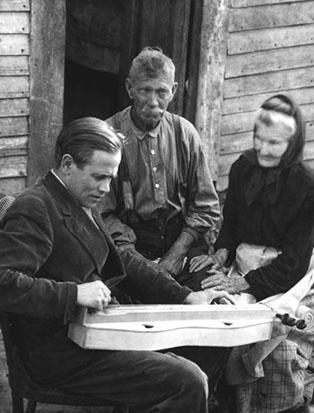 The extraordinary John Jacob Niles was born in Louisville, Kentucky in 1892 and right from his teenage years had a deep interest in traditional folk tunes which he would hear, transcribe and perform.
The extraordinary John Jacob Niles was born in Louisville, Kentucky in 1892 and right from his teenage years had a deep interest in traditional folk tunes which he would hear, transcribe and perform.
Appalachian songs were his particular interest, those songs which had fetched up in the mountains from Ireland, Scotland and England, had been changed in their lyrics sometimes but retained the ancient British ballad forms.
After WWI when he served, he stayed on in Europe and studied in Paris then returned to the US where he continued his research in a more academic way, began performing the songs on radio and used his voice to also sing opera.
That operatic quality – range, drama and melodrama – ideally suited many of the songs he had rescued and he also wrote his own material in the tradition.
Songs like the murder ballad Pretty Polly (which Dylan sang in his early days at New York's Gaslight Club and used the tune for Ballad of Hollis Brown) and the Scottish ballad Barbara Allen (which Dylan also sang at the Gaslight and said inspired Girl from the North Country) came into the American folk scene thanks to Niles.
He also wrote the famous I Wonder As I Wander, a Christian hymn based on a mere fragment of a traditional song he had heard. (Somewhat improbably Barbra Streisand covered it on her 1967 Christmas album.)
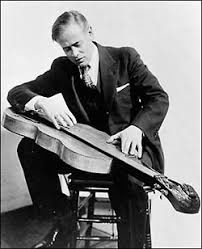 Niles made his own dulcimers also and his work was much recorded.
Niles made his own dulcimers also and his work was much recorded.
But aside from those songs he unearthed and brought to the light which influenced a generation of young folk singers (Joan Baez, Jerry Garcia and many others were also inspired by him) it was that voice which was so compelling.
He won over the writer Henry Miller who said this of listening to Niles' recordings: “Our favorite was I Wonder As I Wander, sung in a clear, high-pitched voice with a quaver and a modality all his own.
“The metallic clang of his dulcimer never failed to produce ecstasy. He had a voice which summoned memories of Arthur, Merlin, Guinevere. There was something of the Druid in him.
“Like a psalmist, he intoned his verses in an ethereal chant which the angels carried aloft to the Glory seat. When he sang of Jesus, Mary and Joseph they became living presences.
“A sweep of the hand and the dulcimer gave forth magical sounds which caused the stars to gleam more brightly, which peopled the hills and meadows with silvery figures and made the brooks to babble like infants.
“We would sit there long after his voice had faded out, talking of Kentucky where he was born, talking of the Blue Ridge mountains and the folk from Arkansas . . ."
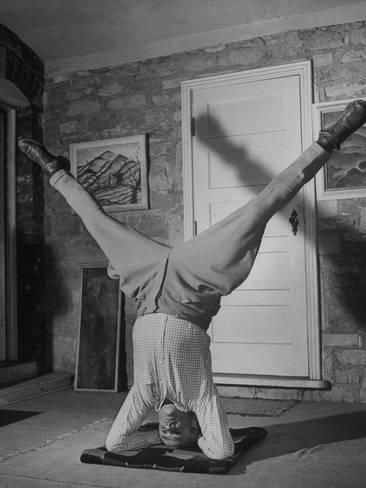 Today there is the John Jacob Niles Center for American Music, a collaboration between the University of Kentucky School of Music, the College of Fine Arts, Appalachian Studies Program, and the University Libraries. It was assisted by a grant from Niles' family. The collection includes some of the instruments he made alongside his voluminous archives.
Today there is the John Jacob Niles Center for American Music, a collaboration between the University of Kentucky School of Music, the College of Fine Arts, Appalachian Studies Program, and the University Libraries. It was assisted by a grant from Niles' family. The collection includes some of the instruments he made alongside his voluminous archives.
Niles – who died in his hometown in 1980 at age 87 was no musty archivist however, he once said – in words which Dylan would echo in his own life and lyrics – “Never let the dull facts interfere with a good yarn”.
And that – along with hearing his astonishing voice, a more earthy Anohni if you will -- – is why we need to talk about John Jacob Niles.
.
There are a number of albums by John Jacob Niles on Spotify, this compilation is recommended.
.
For other articles in the series of strange or different characters in music, WE NEED TO TALK ABOUT . . . go here.

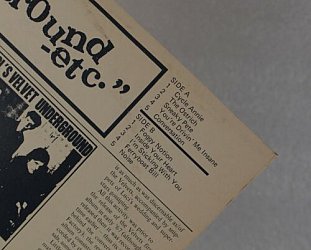
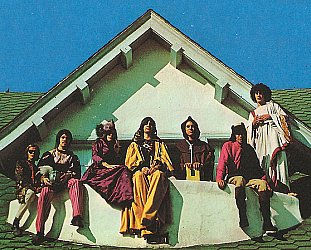
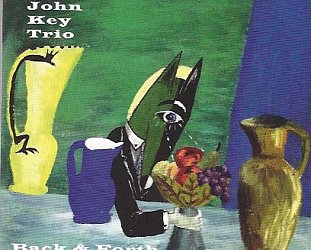

post a comment